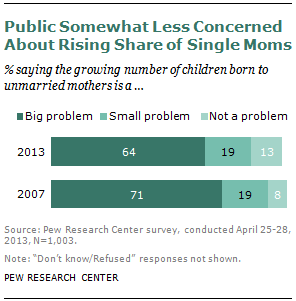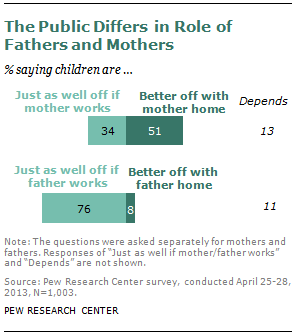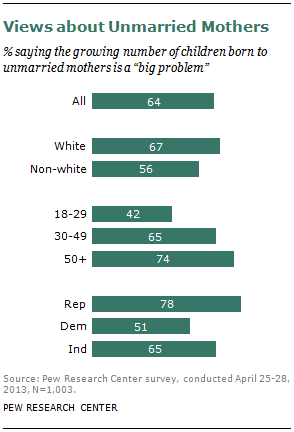South Dakota's 2006 gay-marriage ban has coincided with a drop our marriage rate and an increase in the rate of births to unwed moms.
Nationally, the recession has coincided with another shift in family values. Pew Research finds that moms viewing full-time work as their ideal situation outnumber moms thinking full-time mom duty is best:
...a Pew Research Center survey conducted in November 2012 found that mothers’ views about whether and how much they would like to work had changed significantly since 2007 (before the recession officially began). The share of mothers saying their ideal situation would be to work full time increased from 20% in 2007 to 32% in 2012. And the share saying they would prefer not to work at all fell from 29% to 20% [Wendy Wang, Kim Parker, and Paul Taylor, "Breadwinner Moms," Pew Research, 2013.05.29].
Pew's April survey on this topic finds that working women are now the sole or primary breadwinners in 40% of American households. But some attitudes about women's work are lagging.
A slim majority (51%) still say kids are better off with Mom at home. But the percentage of folks who say the same about Dad (8%) is almost negligible. I can take the position that kids are better off with one parent at home to raise them through pre-school years and then greet them at the door with cookies when they come home from elementary school. But the overwhelming popular sentiment appears to be that Dad would just burn those cookies.
A strong majority of folks hold to the idea that the growing number of children born to single moms is a "big problem." But that majority has declined through the recession:

Pew also finds some significant splits in attitudes about single moms:
Note the age difference: only 42% of 18- to 29-year-olds see unmarried moms as a big problem, compared with 65% of the 30-49 crowd and 74% of grannies and grampies. It would be interesting to longitudinalize this survey and see if those young people carry that attitude shift into their older years or if becoming parents and grandparents will boost that concern. That higher concern among current old folks could be old-fashioned conservatism... but it could also be the fact that they get stuck babysitting their kids more!
My lucky experience of having both my wife and me home most of the time for our little one for four years while working online provided her with stimulation and stability that made her more ready for school. I'd like everyone in South Dakota to have the freedom to choose that arrangement or to send just one parent out to work while the other stays home to provide their children the best upbringing possible. Alas, with our low wages, most South Dakotans find that arrangement a luxury, not a reasonably practical choice. We need to focus on some serious economic reform first; then maybe we can get around to shifting our attitudes toward more gender equality.
But first, I'd better get my little one some breakfast.



Cory,
Unfortunately, I think you'll find that wages across the US have stagnated over time universally to ensure both parents must work to bring home enough bacon to support a family. This isn't just a problem with South Dakota's wages; Minnesotans are in the same boat as us.
Upper Midwest and New England—interesting geographical clusters, Wayne!
Things are tough all over. But check this out: according to the Bureau of Labor Statistics, South Dakota's average weekly wage in 2012 Q3 was $683, 50th in the nation, behind everyone but Mississippi. Minnesota's average weekly wage was $915, 15th in the nation.
So the question is, with Minnesota and South Dakota so disparate in pay rank, why is it we're in the same boat for stay-at-home mothers?
It doesn't look like it's a Red vs Blue state issue; Texas & California are in the same bracket...
We learn from our experiences when we are young. The old folks grew up in two parent families and see it a problem if different. They thought that when they were young and still do. Those raised by single parents think they are ok so they think that now and will when they are old. This looks like it will last. However, the old way looked like it would last also but there was a cultural shift and it changed. Will there be another general shift and in what direction. The old people think they survived the great depression and are better for the experience and the young people think they survived being raised by a single parent and think they learned from it and are ok also.
ps I made great cookies with my kids.